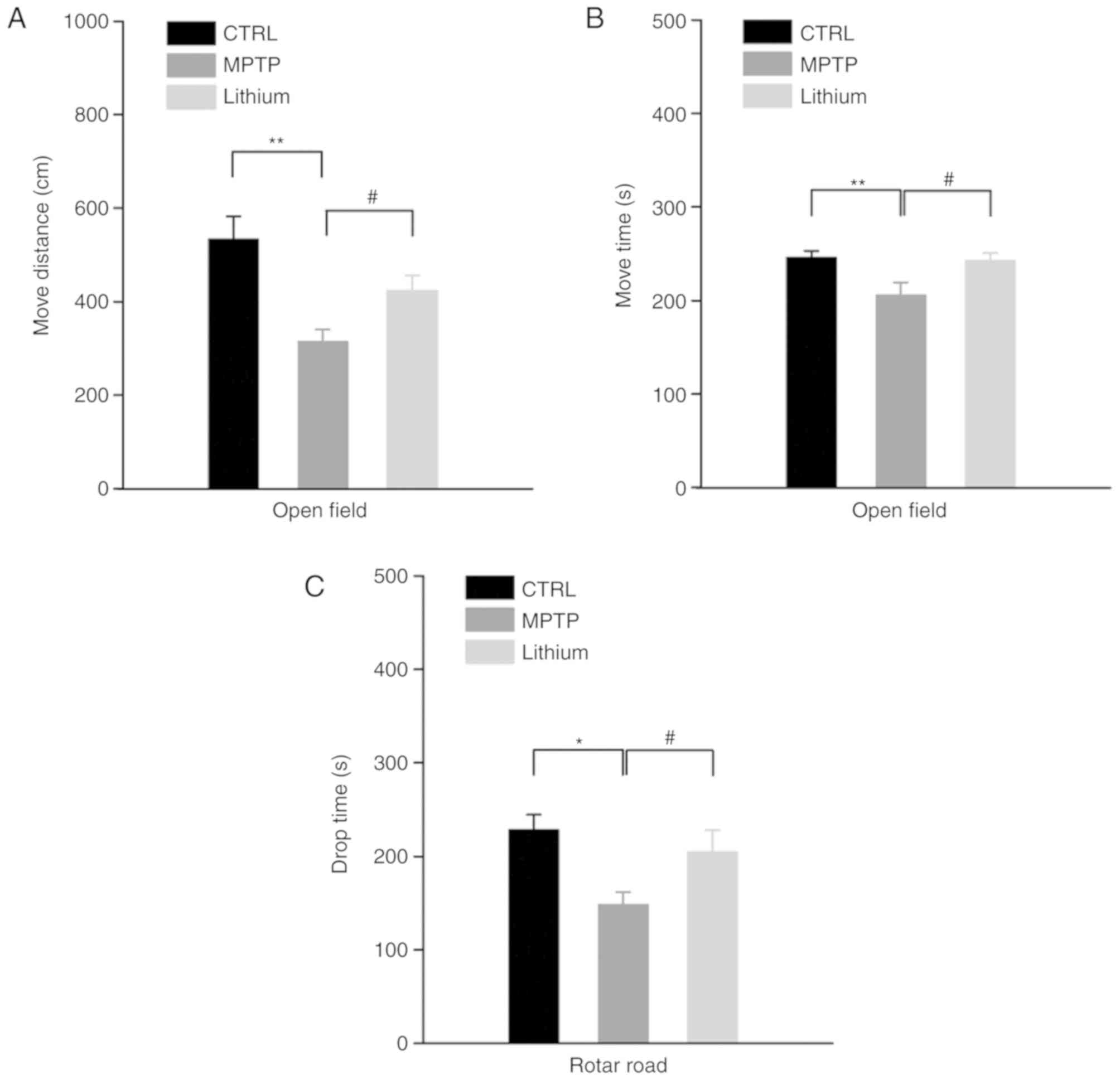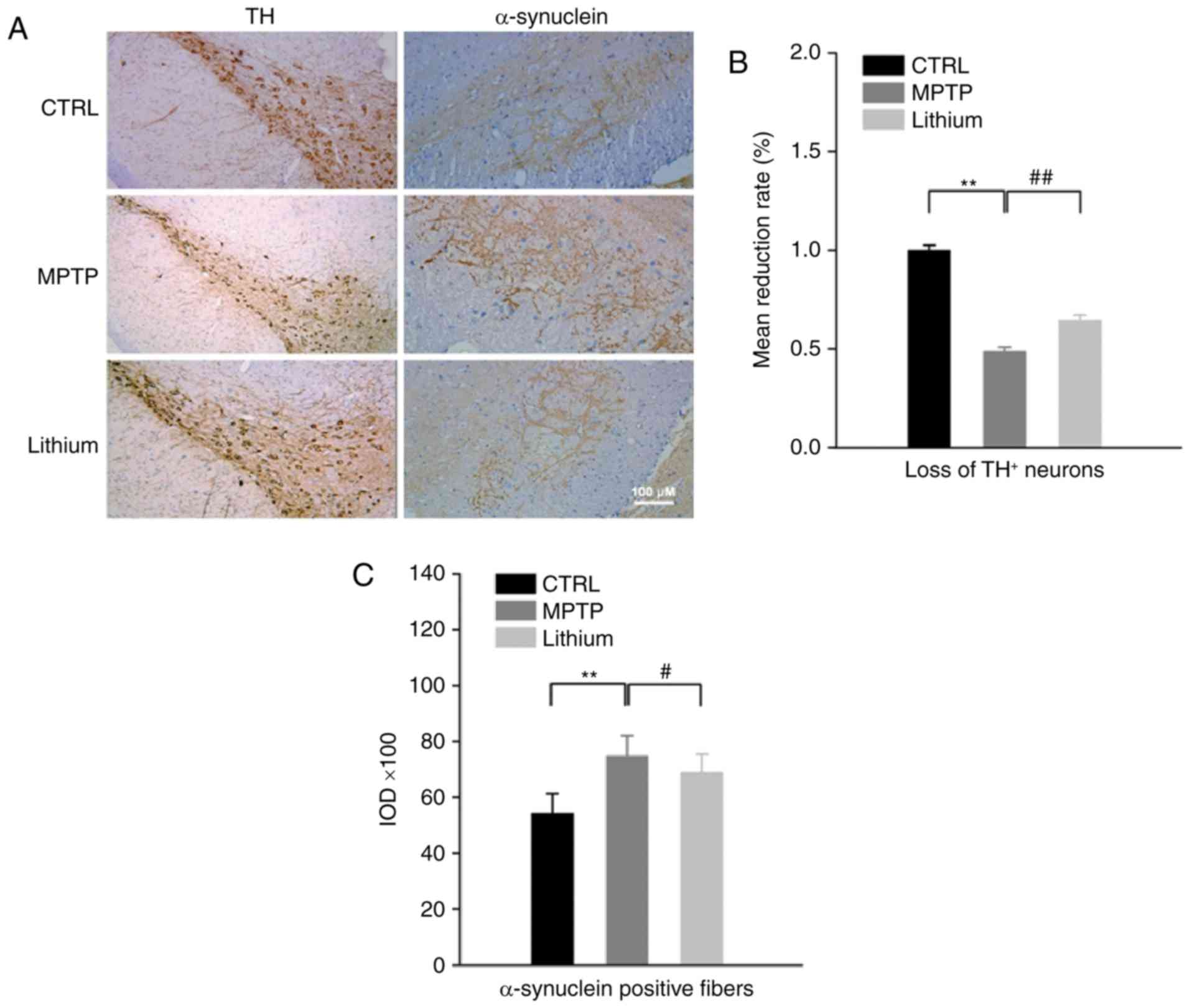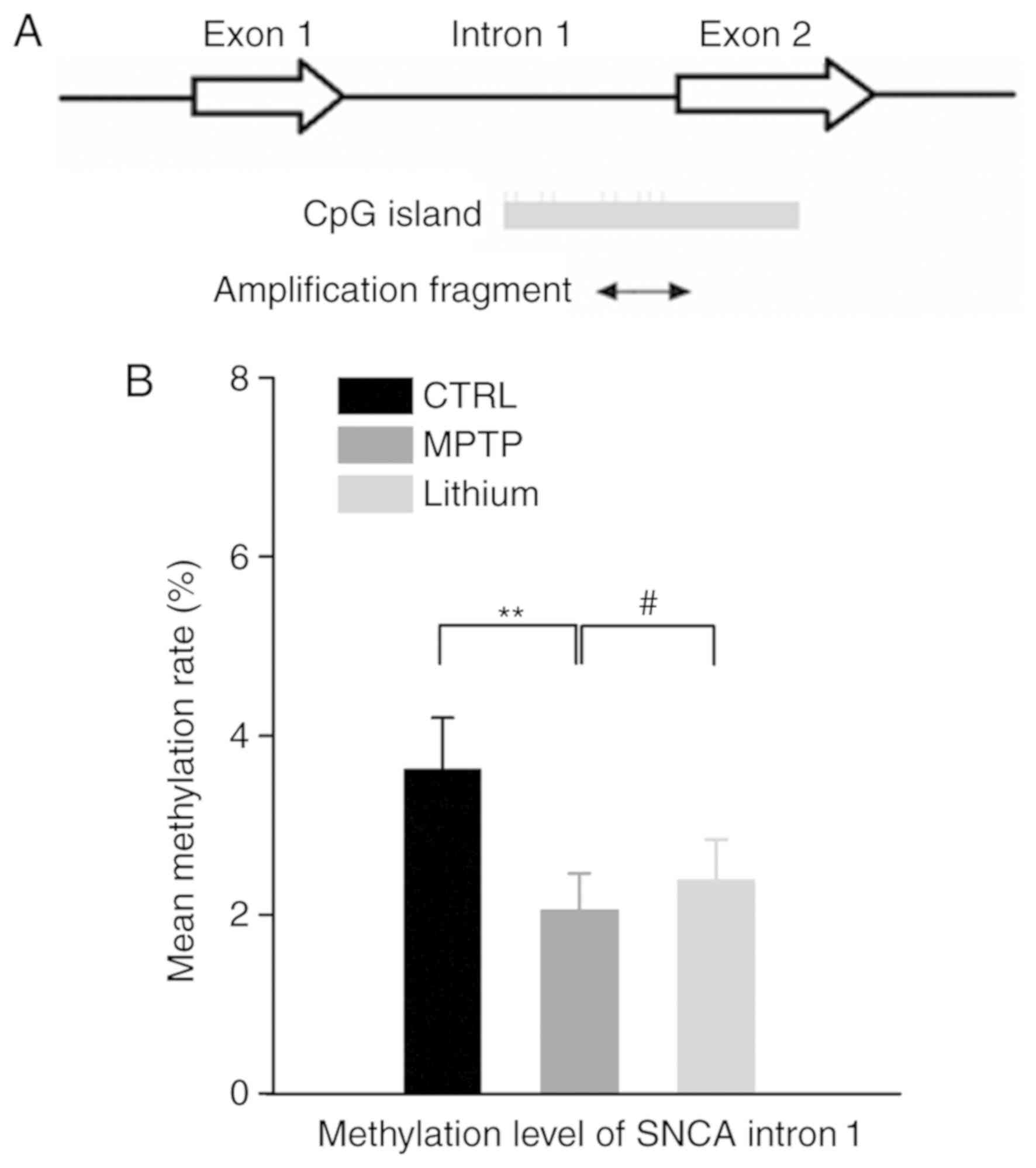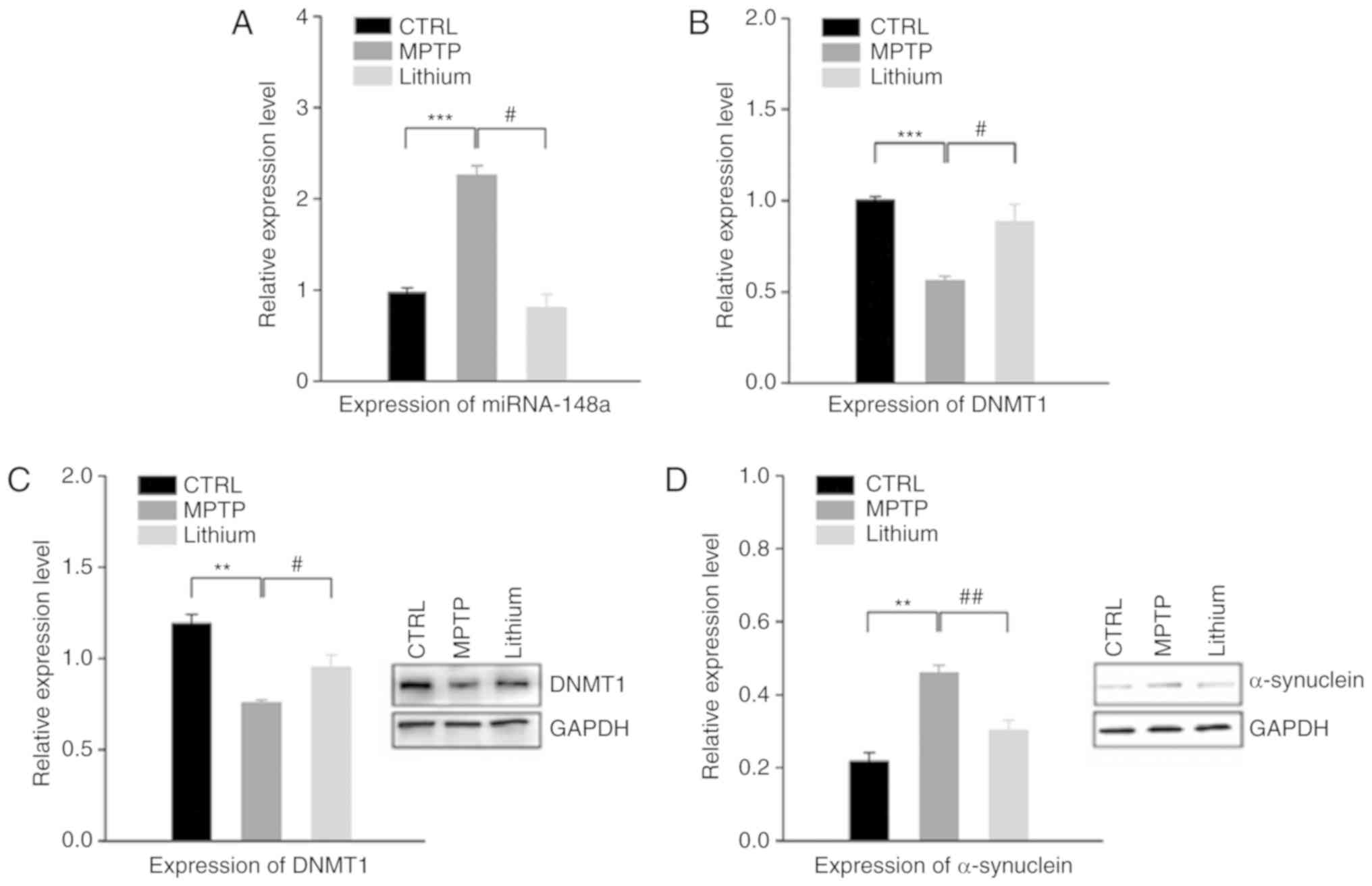|
1
|
Tysnes OB and Storstein A: Epidemiology of
Parkinson's disease. J Neural Transm (Vienna). 124:901–905. 2017.
View Article : Google Scholar : PubMed/NCBI
|
|
2
|
Lotankar S, Prabhavalkar KS and Bhatt LK:
Biomarkers for parkinson's disease: Recent advancement. Neurosci
Bull. 33:585–597. 2017. View Article : Google Scholar : PubMed/NCBI
|
|
3
|
Jowaed A, Schmitt I, Kaut O and Wullner U:
Methylation regulates alpha-synuclein expression and is decreased
in Parkinson's disease patients' brains. J Neurosci. 30:6355–6359.
2010. View Article : Google Scholar : PubMed/NCBI
|
|
4
|
Matsumoto L, Takuma H, Tamaoka A, Kurisaki
H, Date H, Tsuji S and Iwata A: CpG demethylation enhances
alpha-synuclein expression and affects the pathogenesis of
Parkinson's disease. PLoS One. 5:e155222010. View Article : Google Scholar : PubMed/NCBI
|
|
5
|
de Boni L, Tierling S, Roeber S, Walter J,
Giese A and Kretzschmar HA: Next-generation sequencing reveals
regional differences of the alpha-synuclein methylation state
independent of Lewy body disease. Neuromolecular Med. 13:310–320.
2011. View Article : Google Scholar : PubMed/NCBI
|
|
6
|
Chiu CT, Wang Z, Hunsberger JG and Chuang
DM: Therapeutic potential of mood stabilizers lithium and valproic
acid: Beyond bipolar disorder. Pharmacol Rev. 65:105–142. 2013.
View Article : Google Scholar : PubMed/NCBI
|
|
7
|
Rao JS, Keleshian VL, Klein S and Rapoport
SI: Epigenetic modifications in frontal cortex from Alzheimer's
disease and bipolar disorder patients. Transl Psychiatry.
2:e1322012. View Article : Google Scholar : PubMed/NCBI
|
|
8
|
Hou L, Xiong N, Liu L, Huang J, Han C,
Zhang G, Li J, Xu X, Lin Z and Wang T: Lithium protects
dopaminergic cells from rotenone toxicity via autophagy
enhancement. BMC Neurosci. 16:822015. View Article : Google Scholar : PubMed/NCBI
|
|
9
|
Xiong N, Jia M, Chen C, Xiong J, Zhang Z,
Huang J, Hou L, Yang H, Cao X, Liang Z, et al: Potential autophagy
enhancers attenuate rotenone-induced toxicity in SH-SY5Y.
Neuroscience. 199:292–302. 2011. View Article : Google Scholar : PubMed/NCBI
|
|
10
|
Moors TE, Hoozemans JJ, Ingrassia A,
Beccari T, Parnetti L, Chartier-Harlin MC and van de Berg WD:
Therapeutic potential of autophagy-enhancing agents in Parkinson's
disease. Mol Neurodegener. 12:112017. View Article : Google Scholar : PubMed/NCBI
|
|
11
|
Fukumoto T, Morinobu S, Okamoto Y, Kagaya
A and Yamawaki S: Chronic lithium treatment increases the
expression of brain-derived neurotrophic factor in the rat brain.
Psychopharmacology (Berl). 158:100–106. 2001. View Article : Google Scholar : PubMed/NCBI
|
|
12
|
Emamghoreishi M, Keshavarz M and Nekooeian
AA: Acute and chronic effects of lithium on BDNF and GDNF mRNA and
protein levels in rat primary neuronal, astroglial and
neuroastroglia cultures. Iran J Basic Med Sci. 18:240–246.
2015.PubMed/NCBI
|
|
13
|
Kovacsics CE, Gottesman II and Gould TD:
Lithium's antisuicidal efficacy: Elucidation of neurobiological
targets using endophenotype strategies. Annu Rev Pharmacol Toxicol.
49:175–198. 2009. View Article : Google Scholar : PubMed/NCBI
|
|
14
|
Livak KJ and Schmittgen TD: Analysis of
relative gene expression data using real-time quantitative PCR and
the 2(-Delta Delta C(T)) method. Methods. 25:402–408. 2001.
View Article : Google Scholar : PubMed/NCBI
|
|
15
|
Ribeiro D, Ellwanger K, Glagow D,
Theofilopoulos S, Corsini NS, Martin-Villalba A, Niehrs C and
Arenas E: Dkk1 regulates ventral midbrain dopaminergic
differentiation and morphogenesis. PLoS One. 6:e157862011.
View Article : Google Scholar : PubMed/NCBI
|
|
16
|
Senatorov VV, Ren M, Kanai H, Wei H and
Chuang DM: Short-term lithium treatment promotes neuronal survival
and proliferation in rat striatum infused with quinolinic acid, an
excitotoxic model of Huntington's disease. Mol Psychiatry.
9:371–385. 2004. View Article : Google Scholar : PubMed/NCBI
|
|
17
|
Noble W, Planel E, Zehr C, Olm V, Meyerson
J, Suleman F, Gaynor K, Wang L, LaFrancois J, Feinstein B, et al:
Inhibition of glycogen synthase kinase-3 by lithium correlates with
reduced tauopathy and degeneration in vivo. Proc Natl Acad Sci USA.
102:6990–6995. 2005. View Article : Google Scholar : PubMed/NCBI
|
|
18
|
Chen G, Masana MI and Manji HK: Lithium
regulates PKC-mediated intracellular cross-talk and gene expression
in the CNS in vivo. Bipolar Disord. 2:217–236. 2000. View Article : Google Scholar : PubMed/NCBI
|
|
19
|
Soleimani M and Ghasemi N: Lithium
chloride can induce differentiation of human immortalized RenVm
cells into dopaminergic neurons. Avicenna J Med Biotechnol.
9:176–180. 2017.PubMed/NCBI
|
|
20
|
Lieu CA, Dewey CM, Chinta SJ, Rane A,
Rajagopalan S, Batir S, Kim YH and Andersen JK: Lithium prevents
parkinsonian behavioral and striatal phenotypes in an aged parkin
mutant transgenic mouse model. Brain Res. 1591:111–117. 2014.
View Article : Google Scholar : PubMed/NCBI
|
|
21
|
Spillantini MG, Schmidt ML, Lee VM,
Trojanowski JQ, Jakes R and Goedert M: Alpha-synuclein in Lewy
bodies. Nature. 388:839–840. 1997. View
Article : Google Scholar : PubMed/NCBI
|
|
22
|
Braak H, Del Tredici K, Rub U, de Vos RA,
Jansen Steur EN and Braak E: Staging of brain pathology related to
sporadic Parkinson's disease. Neurobiol Aging. 24:197–211. 2003.
View Article : Google Scholar : PubMed/NCBI
|
|
23
|
Singleton AB, Farrer M, Johnson J,
Singleton A, Hague S, Kachergus J, Hulihan M, Peuralinna T, Dutra
A, Nussbaum R, et al: alpha-Synuclein locus triplication causes
Parkinson's disease. Science. 302:8412003. View Article : Google Scholar : PubMed/NCBI
|
|
24
|
Mizuta I, Satake W, Nakabayashi Y, Ito C,
Suzuki S, Momose Y, Nagai Y, Oka A, Inoko H, Fukae J, et al:
Multiple candidate gene analysis identifies alpha-synuclein as a
susceptibility gene for sporadic Parkinson's disease. Hum Mol
Genet. 15:1151–1158. 2006. View Article : Google Scholar : PubMed/NCBI
|
|
25
|
Lai EC: Micro RNAs are complementary to 3′
UTR sequence motifs that mediate negative post-transcriptional
regulation. Nat Genet. 30:363–364. 2002. View Article : Google Scholar : PubMed/NCBI
|
|
26
|
Forman JJ, Legesse-Miller A and Coller HA:
A search for conserved sequences in coding regions reveals that the
let-7 microRNA targets Dicer within its coding sequence. Proc Natl
Acad Sci USA. 105:14879–14884. 2008. View Article : Google Scholar : PubMed/NCBI
|
|
27
|
Creson TK, Austin DR, Shaltiel G, McCammon
J, Wess J, Manji HK and Chen G: Lithium treatment attenuates
muscarinic M(1) receptor dysfunction. Bipolar Disord. 13:238–249.
2011. View Article : Google Scholar : PubMed/NCBI
|
|
28
|
Desplats P, Spencer B, Coffee E, Patel P,
Michael S, Patrick C, Adame A, Rockenstein E and Masliah E:
Alpha-synuclein sequesters Dnmt1 from the nucleus: A novel
mechanism for epigenetic alterations in Lewy body diseases. J Biol
Chem. 286:9031–9037. 2011. View Article : Google Scholar : PubMed/NCBI
|


















